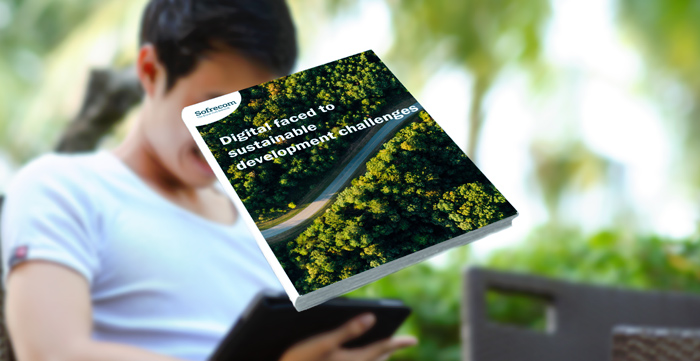
Over the past 20 years, digital technology has transformed our lifestyles and our uses to the point of becoming indispensable. The global health crisis has of course accelerated this digital transition.
Download our white paper to discover our feedback, analysis and testimonials from our experts and partners.
Founded 30 years ago, Cordon Group is now a major player in the circular economy. The repair, renovation and production services, which it develops as close as possible to its customers’ markets, promote responsible, sustainable and ethical electronics. They are all drivers of ecological transformation for operators, manufacturers and distributors.
What are the differences between your electronic equipment reconditioning and recycling businesses?
Cordon Group's rationale is to help its customers, particularly operators and manufacturers, reduce their environmental and societal footprint. We develop innovative repair, renovation and logistics processes that extend the service life of their equipment:
- We collect and renovate 70,000 smartphones and PCs per year, which represents 3,500 tonnes of CO2 equivalent avoided annually.
- We recover and upgrade 16 million Internet boxes a year for new subscribers. As a result, one of our operator customers avoids the emission of 5,000 tonnes of CO2 EQ each year.
- We repair 70,000 coffee machines a year.
Reconditioning avoids having to manufacture new products, as opposed to recycling, which recovers materials without preventing the manufacture of new equipment.
How do your activities help to protect the environment?
Our customers consume less raw materials that contribute to the depletion of resources (such as rare precious metals). They limit their carbon emissions associated with the manufacture, transport and recycling of new products. They also reduce their production of electronic and plastic waste. Our R&D team, which is constantly innovating, has developed processes for renovating plastic materials and accessories (cleaning, polishing, stickers, painting, etc.). Thanks to these processes, we can reuse, for example on the “box” activity, 76% of the plastic recovered.
We only recondition renewable products, using tools for the diagnostic and rigorous sorting of recovered equipment. We always favor short-circuit processing in order to limit carbon emissions and promote local markets. The upshot: a product recovered and reconditioned in France emits less than 2 kg of CO2 over the entire value chain, compared to 50 kg emitted by a new product!
Your activities also contribute to other aspects of sustainable development…
A visionary, Serge Cordon founded the group's development on the three pillars of a CSR approach long before the concept had become widespread in society. Not only do we help our customers and consumers to significantly reduce their environmental footprint, we push forward economic growth and social progress. Our activities reduce the costs of acquiring Internet boxes for new subscribers; they promote the digital inclusion of new consumers; they make it possible to build stocks that avoid the supply of new equipment from Asia; and they develop companies and local skills in our regions.
Finally, we support local employment and especially integration. Our renovation activities account for more than 600 inclusive jobs in adapted companies and penitentiary centers. We also do everything we can to improve the working conditions of our employees in our factories. Our internal satisfaction rating is very positive.
What are the conditions for a successful reconditioning approach?
The creation of a local reconditioning ecosystem is essential if the environmental challenge is to be properly integrated into the entire value chain. In particular, we must: benefit from regulatory incentives; ensure that there are sufficient electronic device collection organizations; be able to rely on private companies responsible for repackaging and the associated logistics, with the support of equipment manufacturers; and educate the market. Although consumer behavior has changed, institutional communications must raise awareness of the issues and benefits of reconditioning, encourage them to return their equipment and purchase refurbished products.
What are the pitfalls to avoid, especially for developing countries?
Our reconditioning approach only makes sense if it is applied at all levels of the chain, as close as possible to local markets, and in partnership with operators, manufacturers and distributors. Exporting products to process them elsewhere is out of the question. To build a viable model, a developing country must ensure that it can recover a sufficient amount of second-hand products, then recondition them and redistribute them locally. Moreover, a European model cannot be transposed as is in an emerging country: market prices, labor prices and quality requirements all differ considerably. A poor economic analysis is therefore the main pitfall to avoid.
In short, what are the benefits of reconditioning at different levels in the value chain?
Consumers are increasingly attentive to environmental issues. They are aware of their power over societal matters. They seek to consume more responsibly without abandoning the latest technological innovations. Reconditioning, along with product upgrade, is the virtuous solution that meets the expectations of today's consumers. It gives operators, manufacturers and distributors the opportunity to provide a quality offer produced locally, at competitive prices, while respecting the environment. Finally, reconditioning furthers the economic and social dynamism of the countries concerned, and promotes the dissemination of good practices in terms of the circular economy.
From our white paper : Digital technology faced with sustainable development challenges
Cordon Group, a leading player in the treatment of electronic equipment during its life cycle
Chairman and Founder: Serge Cordon
20 sites in 7 countries: France, Italy, Germany, Romania, Hungary, Mexico, Brazil
2,800 employees
€270m in sales in 2020
22 million products processed worldwide
160 g of CO2 emitted per product processed over the entire logistics loop
€500,000 invested in the renovation of buildings in 2020-2021 with a targeted 20% reduction in emissions by 2025 (energy consumption in factories, transport of materials, car fleet).
Strong values: responsible commitment to transform the electronics sector through innovation and listening to direct customers and end-consumers alike. Winning spirit to find new markets and develop them as close as possible to customers by putting people at the heart of activities.





